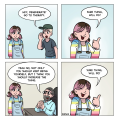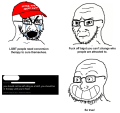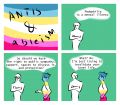One of our staff members is contributing considerably to a News Archiving service at Mu. Any well educated (Masters, PhD or above) users who wish to make comments on news sites, please contact Jim Burton directly rather than using this list, and we can work on maximising view count.
Pro-recovery
 | ||||||
| NewgonWiki's series on MAP culture war and war of adjacency | ||||||
|---|---|---|---|---|---|---|
|
| ||||||
| "Normalization" | "Groomer" | Trans Kids Validity Policing | Lolicon Debate MAP & LGBT Alliances | Proship Pedophobia | Vigilantism | Moral panic Masculism | Feminism | Queer Ageism | Censorship | Hoax pedophilia Anti | Pro-recovery | Alternative Initialism Transage | Kinky Kids | Assimilationism Right-wing politics | Communism Activist model Erastoconservatism (pro-pederasty) |
||||||
|
| ||||||
| Template: Adj - This template |
Pro-recovery describes a position adjacent to, and occasionally within MAP, Ζoo and paraphilia communities that is purportedly tolerant of sexually non-normative individuals on the condition they work with others in an attempt to "correct" or "get over" their "disorders". "Help" is generally seen as exercising a "choice", as in the ex-gay movement, and may also be interpreted as seeking a clinical referral. Seeking help may also involve associating online with unqualified, pro-recovery individuals, some of whom are known to be antis, and fanpol who are themselves potentially unstable and engaged in doxxing MAPs. Pro-recovery ideology is therefore a controversial concept, not only because of comparisons with conversion therapy, but because pro-recovery spaces are widely considered to pose an actual threat to the security of MAPs, even within anti-contact communities.
Pro-recovery antis might come from a variety of political backgrounds, but unlike outright antis, tend towards the left-liberal end of the spectrum - associating on websites such as Tumblr and Twitter - showing support for trans, A-spec, Pro-fiction (occasionally), etc. A 2018 piece in Vice quoted an individual whose views are pro-recovery:
"Reblog this If you hate MAPs but you’re pro recovery for ‘MAP’ minors,” reads one post from an anti-MAP account, “and hope they get the help they need and separate themselves from these pedophiles who have convinced them they have no choice."[1]
History
Members of the paraphilia community have witnessed widespread use of this term since around 2021, but as documented above, it had been used previously. It had seen previous use in eating disorder/anorexia recovery communities since at least the early 00s, and has likely been borrowed.[2]
The origin of the term has been incorrectly ascribed to an anti group/individual going by the name of Phase, which led to the favourable but ahistorical claim that "pro recovery" initially referred to recovery from trauma among paraphiles. Phase was active around 2021/22 on X.[3]
Recovery from psychological distress?
Some terminally-online individuals have correctly identified that sociogenic distress, linked to nonstandard sexual traits (i.e. pedophilia) is considered necessary to establishing a paraphilic disorder. They have subsequently attempted to troll pro-recovery discourse by claiming that social destigmatization of those interests is their primary method of achieving full "recovery" from the "disorder".
Gallery
-
Go to therapy...
-
When conversion therapy isn't conversion therapy
-
Pedophilia is a mental illness... so
External links
- MAP Wiki article - Historical context inside paraphilia community.
- Recovering from Pedophilia - Self-help book.
!["Pro-recovery" type definition of NOMAP[4]](/wiki/images/thumb/Pro2rec.png/120px-Pro2rec.png)


